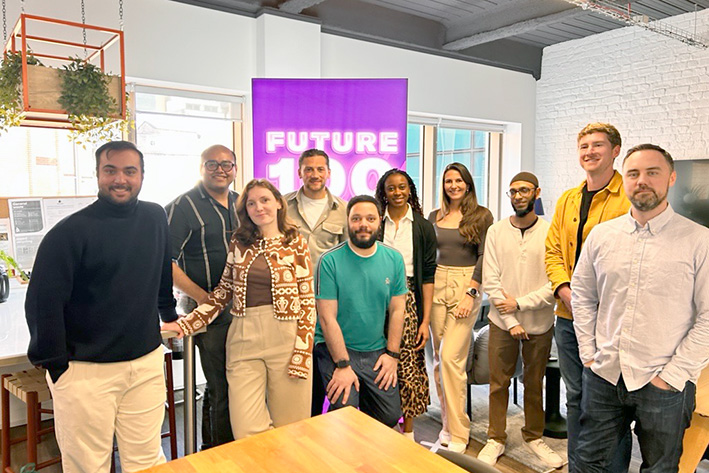Future 100: Agencies offer valuable ‘healthy scepticism’ for brands


Agencies may face a multitude of challenges, but they continue to be valuable to advertisers by offering “healthy scepticism”.
That was the main theme of discussion during a recent Future 100 roundtable comprising mostly agency employees.
The group discussed the variety of challenges facing agencies currently. Top of the list, perhaps unsurprisingly, was measurement.
While Hannah Moody, business director at Mediaplus UK, mentioned the need to recognise blended reach, December19 managing director David Lucy pointed to agencies’ “duty of responsibility” to understand data from walled gardens.
Similarly, James Richmond, trading business director at Digital Cinema Media, highlighted the range of currencies available and “understanding the value of that currency”.
For Azad Ali, addressable partner at Dentsu, it’s about agencies “having an in-depth understanding of all the available solutions to us”.
Inclusive planning is another significant issue to grapple with, according to Aisha Addison, senior associate director at EssenceMediacom. For her, the focus needs to be on reaching a public that “represents the changing demographics, not just ethnic disparities”, so that you’re not “condescending” your audience.
Barry Walsh, digital strategy partner at Havas Media Network, added that this is compounded by the current use of “generic audience segments and cohorts”.
Elsewhere, Amitesh Das, AV account manager at EssenceMediacom, highlighted the proliferation of media, “but content is still content”.
As Sophie Bellon-Gibbons, business director at JAA, noted, the dual challenge of the diversification of audiences and media channels: “How then do we reach these audiences and prove the effectiveness of reaching them in these new channels?”
The long and the short
For advertisers, there’s perhaps too much of a focus on immediate returns — something that Bellon-Gibbons called a “race to the bottom”. However, Malay Sud, business director, paid social, at Mindshare, was frank about agencies’ part in this: “We’ve created this culture!”
This makes long-term planning and discussions much harder. As Das explained, it’s easier to show the number of clicks on a website than “prove” someone saw a TV ad and at some point walked outside and saw an OOH ad, then later made a purchase online.
Addison observed that, with many marketers working towards quarterly targets, they are not interested when someone tells them switching off TV will have an effect in two years’ time.
Another culprit is the relentless pitch cycles, according to Pedro Ramos, director, retail media strategy, at Mindshare. “You’re making a plan for three years, but in one year’s time you’re pitching,” he argued.
The work of agencies, then, is about challenging clients on the metrics they are using, instead of “the amount of sales that you’re getting tomorrow”, Ramos added.
According to Ali, this includes understanding market share, what competitors are doing and brand perception. However, he conceded: “We’re never going to get clients who don’t care about the numbers.”
Need for answers
The numbers themselves can be confusing, with participants pointing to the at times non-transparent data from walled gardens.
Walsh noted the challenge of making sense of the data beyond “Meta said this, Google said this”, but suggested: “Just because they’re marking their own homework doesn’t mean it’s wrong.”
Lucy, however, took issue with the “probabilistic” nature of this kind of data: “You’re guessing it’s the same type of people who have seen this type of ad versus that type of ad on another platform.” Moreover, he pointed to the “whole other can of worms” in terms of whether an ad has actually been seen.
With so much data available, Ali believes they must be honest with clients about their analysis of the various methodologies, to be able to say to them: “This is what we believe is the best case model at the moment.”
Ramos added: “Clients want outcomes and the summaries.”
Bellon-Gibbons said: “We live in a world where clients want answers. We’ve created this world where we give them answers. So it’s hard for us to turn around to say ‘I’m not sure about this’ because someone else will go ‘I can give you the answers’.”
Moody agreed there’s a balance to be struck between comfort versus the right thing to do, but “you feel like you don’t want to rock the boat”.
Addison, though, pointed out that this debate “justifies the existence of agencies”, with their role being able to offer clients a “healthy scepticism”.
At the end of the day, as Richmond reiterated, it comes down to the need for “a good relationship with clients to trust you”.




